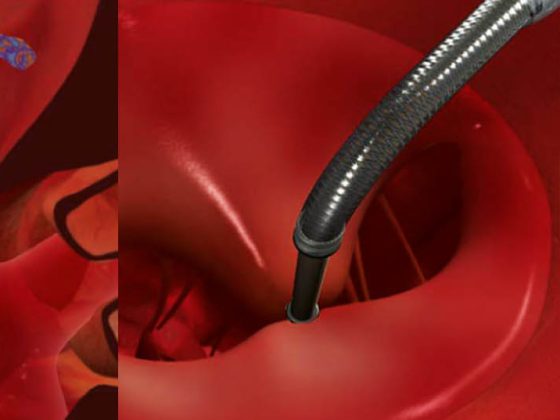At the advanced training day “Pro and Contra in Endocrinology” in Biel, Prof. Marc Donath, MD, Chief of Endocrinology, Diabetology and Metabolism at the University Hospital Basel, spoke on the topic of chronic inflammation in type 2 diabetes. He outlined several ways in which therapy might affect inflammation and mediators of insulin resistance/secretion in the future.
According to Prof. Marc Donath, MD, Chief of Endocrinology, Diabetology and Metabolism at the University Hospital Basel, it has been shown that chronic inflammation occurs in the islets of type 2 diabetes patients. Because interleukin-1 receptor antagonist expression is reduced in pancreatic islets and high glucose concentrations induce interleukin-1β production in human pancreatic beta cells, insulin secretion and also cell proliferation, among other functions, are impaired in these individuals. Beta-cell apoptosis is induced. Larsen et al. [1] therefore performed a study with the recombinant interleukin-1 receptor antagonist anakinra, which proved that blockade of IL-1 improved glycemia and secretory function of beta cells on the one hand, and reduced several markers of systemic inflammation such as interleukin-6 (IL-6, p<0.001) and C-reactive protein (CRP, p=0.002) on the other hand. However, the drug did not have an effect on insulin resistance.
“Subsequently, there have been further studies testing IL-1 antagonism, one of them in prediabetic patients with metabolic syndrome and insulin resistance [2]. Effects on inflammation and insulin secretion were shown, but none on insulin sensitivity,” Prof. Donath explained. “A new phase III study (CANTOS) involving 10 000 patients over four years is now pursuing the question of whether inhibition of the proinflammatory cytokine interleukin-1β is effective in preventing recurrent cardiovascular events. New-onset diabetes and diabetes progression are also being studied as secondary endpoints, which is of interest in our context.”
TNF-α as a mediator of insulin resistance.
In the 1990s, it was found in obese mice that inhibition of tumor necrosis factor alpha (TNF-α) caused a rollback of insulin resistance and improved glycemic control. Shortly thereafter, a double-blind study [3], which was, however, severely underpowered, investigated the influence of anti-TNF-α in obese patients with NIDDM (“non-insulin-dependent diabetes mellitus”, i.e. type 2 diabetes) and came to the sobering conclusion that neutralization of the cytokine in question had no effect on the insulin sensitivity of these patients during a study period of four weeks. This was followed by another underpowered study [4] with a short study duration, which also failed to show such an effect.
Then, in 2005 [5] and 2006 with a larger study population [6] there was initial evidence of efficacy with respect to inflammatory markers, but still no evidence of an effect on insulin sensitivity. Overall, according to Prof. Donath, it has therefore not yet been prospectively proven whether anti-TNF-α can be considered as a therapeutic option in type 2 diabetes. To improve the study situation, the Inflacomb study is currently initiated, which compares the following agents in five arms: anti-TNF-α, anti-IL-1β, salsalate, and their combinations.
Pathways crucial
“In any case, it is useful to look at the pathways that initiate a condition. For example, anti-TNF-α is a good therapy for psoriasis. Many of these patients have type 2 diabetes, so it may be possible to kill two birds with one stone by inhibiting the cytokine. In the case of diabetes and gout (or cardiovascular diseases), anti-IL-1β, and in the case of rheumatoid arthritis and diabetes, one of the two inhibitions can be considered,” says Prof. Donath.
Regulation of IL-6
Physical activity, obesity, and type 2 diabetes are associated with increased plasma concentrations of IL-6. The muscles are responsible for the strongest release of IL-6, much less, but nevertheless also involved is the adipose tissue. Studies show that administration of IL-6 or increased IL-6 concentrations after exercise stimulate GLP-1 secretion, which in turn improves insulin secretion and glycemia [7].
“IL-6 is thus involved in the regulation of insulin secretion. Medication or targeted exercise that interferes with this loop may be beneficial in type 2 diabetes. In any case, the harmful chronic increase in IL-6 levels must be distinguished from the short-term acute increase (e.g. through exercise),” Prof. Donath concludes.
Source: “Targeting inflammation in the treatment of type 2 diabetes”, presentation at the Advanced Training for FMH Specialists in Endocrinology/Diabetology (FOSPED): Pro and Contra in Endocrinology, March 27, 2014, Biel.
Literature:
- Larsen CM, et al: Interleukin-1 receptor antagonist in type 2 diabetes mellitus. N Engl J Med 2007; 356: 1517-1526.
- van Asseldonk EJ, et al: Treatment with anakinra improves disposition index but not insulin sensitivity in nondiabetic subjects with the metabolic syndrome: a randomized, double-blind, placebo-controlled study. J Clin Endocrinol Metab 2011 Jul; 96(7): 2119-2126. doi: 10.1210/jc.2010-2992. epub 2011 Apr 20.
- Ofei F, et al: Effects of an engineered human anti-TNF-alpha antibody (CDP571) on insulin sensitivity and glycemic control in patients with NIDDM. Diabetes 1996 Jul; 45(7): 881-885.
- Paquot N, et al: No increased insulin sensitivity after a single intravenous administration of a recombinant human tumor necrosis factor receptor: Fc fusion protein in obese insulin-resistant patients. J Clin Endocrinol Metab 2000 Mar; 85(3): 1316-1319.
- Dominguez H, et al: Metabolic and vascular effects of tumor necrosis factor-alpha blockade with etanercept in obese patients with type 2 diabetes. J Vasc Res 2005 Nov-Dec; 42(6): 517-525. epub 2005 Sep 9.
- Bernstein LE, et al: Effects of etanercept in patients with the metabolic syndrome. Arch Intern Med 2006 Apr 24; 166(8): 902-908.
- Ellingsgaard H, et al: Interleukin-6 enhances insulin secretion by increasing glucagon-like peptide-1 secretion from L cells and alpha cells. Nat Med 2011 Oct 30; 17(11): 1481-1489. doi: 10.1038/nm.2513.











